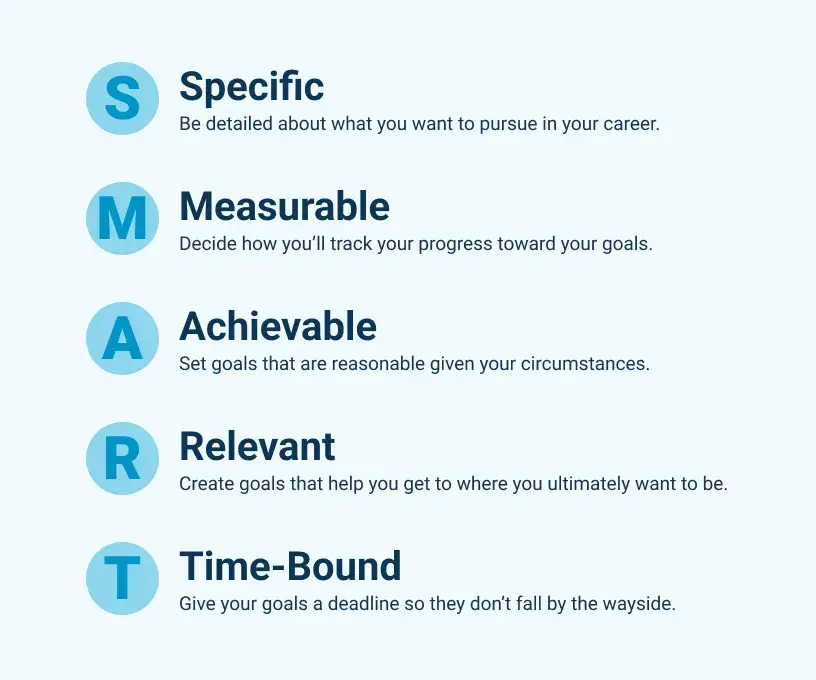Table of contents
Pursuing Your Career Goals: Strategies and Examples

Table of Contents
Key Insights:
- Career goals represent professional pursuits and can include earning a degree, obtaining a certification, landing a new position, and more.
- Setting career goals is important because it can help you stay ontrack, keep you motivated, and give you a sense of purpose.
- Use SMART goals to move forward in your career, put reminders in place to keep these goals in front of you, and utilize your professional connections and other helpful resources to help you along the way.
At Ultimate Medical Academy, we offer more than healthcare degree programs. We’re committed to helping our learners and grads pursue a career in their field of study. Creating career goals can be a valuable step in this direction. Here’s what you need to know about career development goals, including a few tips to help you set yours.
Understanding Career Goals
Defining career goals can be difficult because this phrase can mean different things to different people. For some, career goals are synonymous with job goals. They think about the positions they’d like to hold, the employers they want to work for, or the tasks they’d like to perform.
Others may envision career goals as the steps they need to take to advance in their careers. This may include earning a certification to become a more appealing job candidate. Or it might involve gaining the education needed to pursue a higher-level role.
Career goals can also be professional growth goals, like building the skills needed to become more efficient or confident in your current position. These goals are less about moving up in a specific field and more about becoming the best professional you can be in the role you’re in.
Different types of career goals
What’s the difference between short-term and long-term career goals?
- Short-term career goals can typically be met within a few years (if not sooner). Examples include earning your diploma or degree, obtaining an industry-relevant certification, or getting your first job in that field.
- Long-term career goals represent what you’d like to pursue in the next three to five years, and beyond. Examples include moving into a higher-level position, earning a more advanced degree, or obtaining a leadership role.
3 Reasons to Set Career Development Goals
If you’ve not set career goals for yourself, here are three reasons why you may want to take the time:
-
#1: They keep you on track.
It can be easy to get caught up in your day-to-day life. You become so focused on handling your home and work obligations that your professional aspirations get set aside. Setting career goals reminds you of what you want your work life to look like down the road, also nudging you to take the steps needed to make that vision a reality.
-
#2: They give you a sense of purpose.
It can feel empowering to work toward something you’re passionate about. When you set career goals, you’re deliberately choosing where you want to be one, five, or 10 years down the road. You are taking control of your professional life, and the goals help to serve as a road map to pursuing your dreams.
-
#3:They help you stay motivated.
There’s a reason you want your specific career goals — something about them fills you with excitement, hope, or another positive feeling. Remembering the “whys” behind what you want professionally can motivate you to push through tough days as you work toward your future life.
Examples of Effective Career Goals
We’ve talked a lot about what career development goals are and why they’re important. Before you set yours, it can be helpful to look at examples. These can give you ideas for goals you may want to set for yourself or inspire you to dream bigger about your healthcare career than you ever did before.
Here are a few examples of short-term and long-term career goals:
- Pursue a new career path
- Get a diploma or degree
- Earn a certification
- Work for a specific employer
- Pick up a new skill or enhance an existing skillset
- Learn a new technology or type of equipment
- Improve your productivity or performance
- Cross-train in another area
- Mentor someone else
- Advance to a leadership position
How to Set SMART Career Goals
Research indicates that “self-regulation is the cornerstone of career development,” adding that self-regulation is built, in part, on setting SMART goals.1

Here’s what setting a SMART career goal may look like: imagine that you’re ready for a career change and want to enter the healthcare field. After doing a bit of research, you decide to pursue a medical billing and coding career path.
A specific healthcare career goal would be to earn your medical billing and coding diploma to prepare for this role. You could measure your progress through the educational process, from enrolling in classes to completing your coursework to finally earning your degree.
If you work full-time and take care of a family, choosing an online medical billing and coding program may help make this goal achievable. The goal is relevant because it prepares you to pursue this healthcare role. You can also make it time-sensitive by deciding that you want this diploma within one year, creating some urgency to meet your deadline.
Think about the career goals you want to pursue. Be specific and decide how you’ll measure your progress. Make sure they’re achievable and relevant to your career and then give yourself deadlines to get them done.
Having trouble setting your career goals?
If you’re struggling to decide your career goals, answering these questions may help:
- What are your passions and interests? This question can help you choose a career path. Maybe you’re passionate about helping others and like the idea of spending your workdays behind a computer. This could align with behind-the-scenes healthcare roles like medical biller and coder, medical administrative assistant, or a role in health information management. On the flip side, you could be a person who loves working one-on-one with others. This may make direct care roles like nursing assistant, medical assistant, or dental assistant more appealing instead.
- What type of position do you picture yourself retiring from? Your answer to this question can help you determine your long-term career goals. Based on where you want to be toward the end of your career, think about the steps needed to get there. You may need a higher level of education, for instance, or more experience in your field. Turn these steps into short-term goals and start working toward them.
- What skills could help you move forward in your career path? This question is good for setting professional growth goals. Think about skills that can help you excel in your position or prepare you for higher-level roles. Look for training programs that can help you gain or enhance skillsets and include them in your career goal plans.
Pitfalls to avoid when setting career goals
Setting professional goals isn’t always easy. Here are a few challenges you may face, as well as how to work past them.
| Career Goal Challenge | How to Work Past It |
|---|---|
| You know what you want to do in your career but are afraid to go after it because you don’t have the education or skills required. | Find out what education and skillsets are needed to enter your desired role, then enroll in a program that provides you with these qualifications. |
| You’d love to pursue a new career, but between work and home obligations, you don’t have a lot of free time to attend in-person classes. | Look for online training programs that enable you to take your courses on a schedule you can fit into your life. |
| You have career goals, but you’ve also been putting them off because you don’t have the money to pay for education or training programs. | Choose an institution that offers financial aid assistance and can help you find resources you may qualify for based on your situation or circumstances. |
| You want to pursue your career goals, but you also don’t have much support, so you fear that you won’t be able to reach them on your own. | Select an institution with a focus on student services, giving you the support and encouragement you need as you work toward your career goals. |
Tips for Pursuing Your Career Goals
Once you have your professional goals set, it’s time to start working toward them. Here are a few tips:
-
Visualize your future life.
Picture yourself once you’ve achieved your career goals. Imagine what your days are like and notice how you feel. Use these feelings and images to compel you to continue moving forward.
-
Keep your goals in front of you.
Write your career goals on an index card and keep them on your nightstand, next to your computer, or somewhere you’ll see them every day.
-
Reward your achievements.
Pursuing career goals isn’t always easy. Take time to celebrate your accomplishments along the way, no matter how small.
-
Share your goals with someone who supports you.
Not only does this give you someone in your corner to keep encouraging you, but it also helps to hold you accountable. Ask them to check in with you regularly.
-
Network with others.
Connect with professionals in your field. Learn from them, exchange ideas, and ask for feedback. Network contacts can be a good source of support and may even refer you to new opportunities.
-
Find a mentor.
It’s often said that no one achieves success alone. Find someone in your desired position or with your desired skillsets and ask if they’re willing to help you in your journey.
-
Review your career goals regularly.
Just as we change over time, what we want professionally can change, too. Once a year, look at your career goals and consider whether they’re still important to you. If not, adjust them or create new ones altogether.
Resources to Support Your Healthcare Career Goals
If your career goals involve the healthcare field, Ultimate Medical Academy (UMA) is here to help. We offer both online healthcare programs2 and on-campus healthcare career training options at our Clearwater Campus.
UMA’s healthcare diploma and degree programs are designed to provide the education and skills needed to pursue entry-level healthcare roles. Many include certification prep,3 with some also providing hands-on training in the form of a practicum or externship.
If you’re unsure which healthcare career path may be a good fit for you, our Healthcare Career Guide can give you a few options. You can also take our short Healthcare Career Quiz to see which programs may align with your personality and interests.
Why choose UMA to help reach your career goals?
- Most of our diploma programs can be completed in 11 months or less,4 enabling you to pursue entering the healthcare field sooner rather than later.
- We place a strong emphasis on student support, giving you access to team members who can help you with financial aid if qualified, answer your questions about coursework, and more.
- Our support doesn’t stop when you graduate. Whether you want to create a compelling resume, prepare for a job interview, or need another type of assistance when finding a job, our Career Services team is here to help.
Contact us to learn more about how UMA can help you pursue your healthcare career goals. We look forward to speaking with you!
FAQs
-
What are career goals?
They’re the goals you want to pursue professionally, which may include positions you want to hold, skills you want to develop, or other things you want to accomplish in your work life.
-
What are some career goals?
Examples of short-term career goals include getting a diploma or degree, earning your certification, or finding your first job in your chosen field. Long-term career goals may include holding a leadership position, obtaining a higher-level degree, or mentoring others.
-
What are good career goals?
This can vary from one person to another. To determine good career goals for you, think about what you’d like to pursue in your professional life. Consider your passions, interests, and what you want your workday to look like. These factors can all play into your career goal plans.
-
How to pursue career goals?
Set goals using the SMART method (make them specific, measurable, achievable, realistic, and time-sensitive), remind yourself of these goals regularly, and celebrate your small wins along the way. Network with others who can help you grow professionally and review your goals regularly to make sure they’re still important to you, adjusting them if needed.
1 Rezaiee, M., & Kareshki, H. Empowering career pathways: Integrating strategies with career counseling practices. Sec Leadership in Education. https://www.frontiersin.org/journals/education/articles/10.3389/feduc.2024.1422692/full
2 Coursework is online except for an on-site externship/practicum in select programs.
3 Learners must meet eligibility criteria to sit for applicable certification exams.
4 Completion times vary depending on the individual student.
Request Information
Talk with us. Start your journey.
Complete this form and we'll call you to explore options at UMA and answer your questions. We'll also email you info on how to get started. We're with you at every step!
Request Information
Talk with us. Start your journey.
Complete this form and we'll call you to explore options at UMA and answer your questions. We'll also email you info on how to get started. We're with you at every step!
About the Author
 Christina DeBusk
Christina DeBuskChristina DeBusk is a freelance writer who has been providing health and wellness content to healthcare organizations such as the American Chiropractic Association and International Sports Sciences Association (ISSA) since 2011. She obtained her Bachelor of Science in Sociology from Central Michigan University, minoring in psychology. She has also earned several ISSA certifications, including Certified Personal Trainer and Certified Nutrition Specialist, achieving the status of Elite Trainer.
Related Content


4 Ways to Improve Your Problem-Solving Skills as a Healthcare Professional
Read More